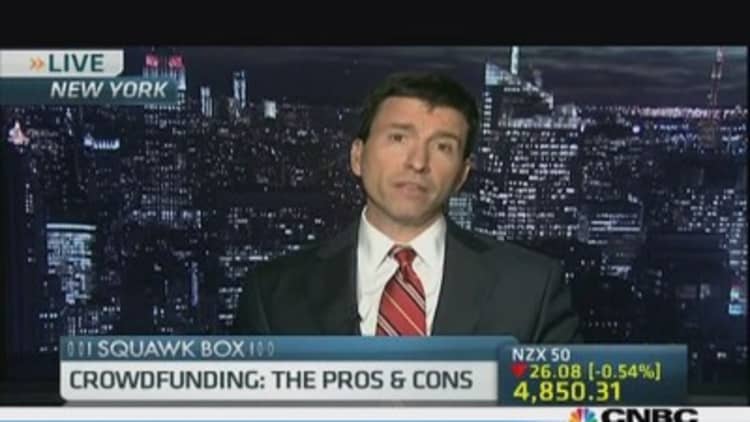
Crowdfunding sounds so small "d" democratic—and it is. Someone seeking funds for a project, typically not for profit or tiny, will post it online. People who are interested in helping will kick in funds, often in exchange for a perk of some kind.
Crowdfunding has particular appeal to social entrepreneurs, partly because of its nature. But until now, it has been hard to use crowdfunding on a scale that would support more than small ventures or nonprofits.
(Read more: Charities get holiday boost from crowdfunding)
Now, though, some entrepreneurs are lining up to take advantage of new regulations coming that could make crowdfunding more useful to for-profit ventures, including those focused on social entrepreneurship.
(Read more: Food with insects)
The regulations have to do with the Jumpstart Our Business Startups Act, also known as the JOBS, Act, passed by Congress in 2012. Sections in the act relate to rules for crowd investing, or crowdfunding in exchange for equity stakes in tiny start-ups.
At issue is who should be allowed to invest in these fledgling ventures—whether the process should be opened to mom and pop investors, instead of those with high incomes and significant net assets—and how much information the start-ups should have to disclose. The public comment period on the SEC's draft of new rules ended in February, and investors are awaiting the final wording.
(Read more: SEC places restrictions on crowdfunding)
Social entrepreneurs like Sang Lee, founder of Return on Change, an investment platform for ventures in social enterprise and industries like life science and education, are excited at the prospect of expanded crowd investing. Return on Change currently limits its offerings to accredited investors, following SEC rules, but Lee is among those lobbying for rules that would allow smaller investors to participate.
"Bringing the democratization of finance to the table gives everybody an opportunity to invest in these awesome social enterprises," he said. "We want to do a lot of investor education in the social enterprise space. Our next big step in the medium term is global expansion, facilitating capital raising for international social enterprises."
Lee and others argue that the social nature of crowd investing will keep fraud at bay, since information will flow freely about any venture that is not on the up and up.
Still, those are loose safeguards, at best, particularly if new ventures are not required to disclose much in the way of financial information. Entrepreneurs will have to contend with regulators' concerns about fraudsters entering a market and fleecing well-intentioned but unsophisticated investors.
(Read more: Why crowdfunding for start-ups could turn out to be a huge mess)

Smaller investors may not even know the right questions to ask to protect themselves and evaluate the prospects of these fledgling enterprises.
In an op–ed column in The New York Times, Gail Collins suggested that the JOBS Act could also be called the Just Open Bucket Shops Act.
Even among legitimate new ventures, the failure rate is high. According to the National Venture Capital Association, 40 percent of ventures fail outright, and another 40 percent "return modest amounts of capital."
Tom Triplett, an attorney and consultant to nonprofits, is mindful of the risks in allowing less sophisticated investors to participate in crowd investing. But he points out that the draft SEC rules on crowdfunding would limit the amount that smaller investors could put into a new enterprise. And he sees another safeguard: the crowd investing platforms themselves.
"In order to access crowdfunding, you have to go through a middleman," he said, pointing to Kickstarter and Indiegogo as examples in the current crowdfunding market. "I also expect that some big financial institutions will see the potential in this and serve as intermediaries."
Presumably, Triplett said, "the intermediary will do some checking, some due diligence, before they agree to take on the enterprise and help it with crowdfunding." Even the existence of that screening should serve as a deterrent to fraudsters, he added. "It's almost guaranteed that there will be fraud or attempted fraud, but those two safeguards will be pretty strong."
With interest in crowd investing running so high, the SEC doubtless has piles of comments to sort through before it issues final rules. It's possible that regulators will be able to thread the needle and find the right line between opening access to a new market and requiring safeguards. But Lee and his fellow entrepreneurs may have to wait a bit longer before the gates are fully open to crowd investing.
—By CNBC's Kelley Holland. Follow her on Twitter @KKelleyHolland.


